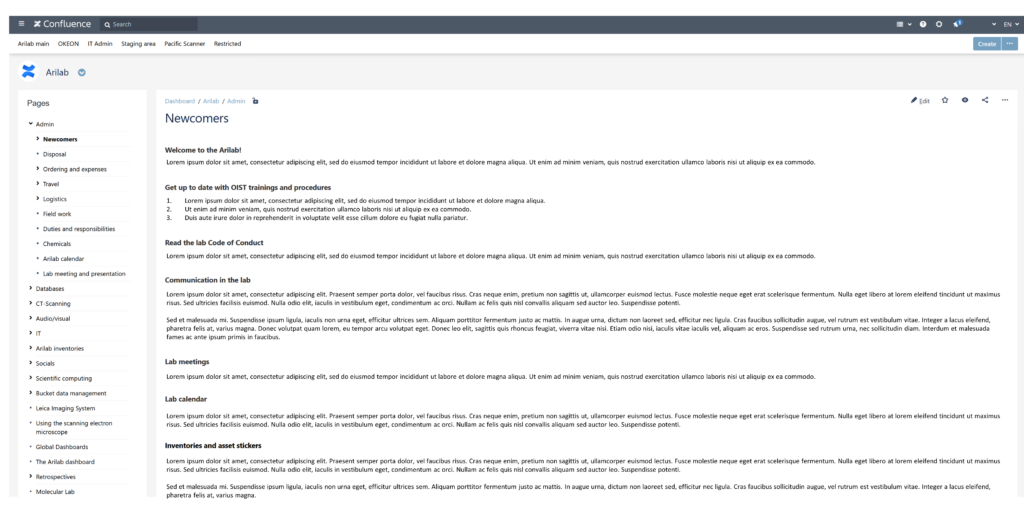Wikis: A Viable Platform for Supporting Academic Research Operations
Wikis: A Viable Platform for Supporting Academic Research Operations
Kosmas Deligkaris
Note: The suggestions and Wiki content presented here are based on relevant work within the Biodiversity and Biocomplexity Unit of the Okinawa Institute of Science and Technology Graduate University (OIST).
Introduction
Research staff in an academic institution is primarily composed of PhD students and post-doctoral/research associates. These appointments are meant to be temporary, and researchers are encouraged to seek alternative positions within a few years (Lam, 2007). In turn, the high turnover rate of research staff may result in the loss of critical, specialized knowledge, negatively affecting research productivity and reproducibility. Besides personnel changes, work in academic groups is also affected by interruptions by email or instant messaging requests (Mark et al., 2016) and the frequent absence of staff (during conferences, for example).
A Wiki is defined as a collection of interlinked webpages, where each page can be edited freely by multiple authors (Pfaff & Hasan, 2006). Wikis are part of the knowledge management systems family and have been used in collaborative learning (Mindel & Verma, 2006), agile software development (Kamthan, 2013), and as domain-specific knowledge bases (Hoffmann, 2008). On top of their basic functionality as collaborative webpage editing systems, modern Wiki platforms provide several additional features that make them suitable for supporting the dynamic nature of research operations.
The purpose of this article is to demonstrate how modern collaborative Wiki platforms can be used to support and facilitate the research process, and to provide a starting point for the efficient implementation of a knowledge management system in academic research settings.
—Wiki platforms provide several additional features that make them suitable for supporting the dynamic nature of research operations—
Applications of Wikis in Academic Research
Consistent documentation of individually held knowledge into a centralized platform creates a trail of information and historic records that allows members to i) understand why previous decisions were made and ii) reproduce established techniques without repeating past errors, aiding in business continuity (Hu et al., 2007). In a research environment, Wikis can serve as a platform for the documentation of research planning, experimental or theoretical protocols, and both positive and negative results, enhancing knowledge sharing and research reproducibility. An example of a Wiki used in a research environment is presented by Au & Ho (2021), where a Wiki-based system was developed to support literature review preparations and archive of research methodologies. In our own group at OIST, a Wiki is supplementing both administrative and research operations (see Recommendations for Wiki Structure and Content section for further details).
 Additionally, a Wiki can serve as the first source of information with which users consult before contacting colleagues, which reduces the need for staff to be always reachable, thus minimizing interruptions. Although more direct approaches, such as email or instant messaging, may be preferred when users need to find something urgently (Stenmark, 2005), they depend on the other party being accessible. If the other person is unable to respond, an always-on IT platform, such as a Wiki, offers an alternative means of immediate information retrieval.
Additionally, a Wiki can serve as the first source of information with which users consult before contacting colleagues, which reduces the need for staff to be always reachable, thus minimizing interruptions. Although more direct approaches, such as email or instant messaging, may be preferred when users need to find something urgently (Stenmark, 2005), they depend on the other party being accessible. If the other person is unable to respond, an always-on IT platform, such as a Wiki, offers an alternative means of immediate information retrieval.
Besides a basic text editor, modern Wiki platforms offer a vast number of additional features, such as creation of diagrams, commenting on pages, elaborate access-control, and integration with various third-party tools and plugins (GitHub integration, Excel file plugin, etc.). In turn, these extended features further aid productivity and can boost the adoption of the Wiki platform. For example, diagramming can be used to quickly sketch out flowcharts or mind maps for experimental or analytical protocols. Diagramming directly on the Wiki, without the use of external software, allows researchers to focus on what really matters: documenting science, rather than trying to find the original source files, which may be on someone else’s hard drive or no longer exist. Besides diagramming, the creation of distinct Wiki sections with integrated access control policies allows for the invitation of internal or external collaborators to relevant parts of the Wiki. Some of the features of modern collaborative Wikis and their applicability to academic research work are listed in Table 1. For a thorough description of various Wiki technology attributes, please see Lykourentzou et al. (2012).
| Feature | Applicability |
| What-you-see-is-what-you-get editor | Ease of use, increases adoption potential from non-technical users. |
| Creation of distinct Wiki sections | Helps in categorization of content, long-term maintainability. |
| Access-control policies | Enables invitation of collaborators to specific sections only; creation of confidential/restricted sections. |
| Exporting pages to Word or PDF | Sharing documentation with external collaborators (with no Wiki access). |
| Comments on pages | Discussion of protocols, results, change requests. |
| Email notifications on page updates | Keeps interested parties updated without direct user involvement. |
| Diagramming directly on Wiki pages | Enables all users to make edits or create diagrams without the need for an external source file. |
| Custom page templates | Creating common page templates for use by all users (e.g., for newcomers’ induction, procurement, off-boarding). |
| Version control | Identify changes in documentation, revert to a previous version. |
| Exporting all content to a standardized format | Keeping archives (e.g., backup purposes, migration to other platforms). |
| Formula-typing capabilities | Allows the documentation of content containing mathematical expressions. |
Considerations Before Wiki Adoption
Naturally, Wikis are not the only system that can improve productivity or reproducibility of scientific research. In software development, for example, version control systems, such as Git, are specifically designed for tracking changes in text files (such as Python scripts). In addition, a GitHub project has its own Wiki pages and issue tracking system, which may render an additional Wiki platform unnecessary. Overall, a Wiki platform is a generic knowledge management tool that should be easy to use and applicable to a diverse range of situations, although not necessarily the most sophisticated for domain-specific applications.
Additionally, Wikis have their own place in the wide selection of available communication tools and are meant to supplement rather than replace them (Stenmark, 2005). For example, email or instant messaging applications can be used to discuss research-related issues as they arise spontaneously during the workday. Further, these discussions may be supplemented by individual meetings, project-wide meetings, and coffee catchups. Therefore, the primary difference between a Wiki and other communication tools is that Wiki pages should serve as the single source of truth for the current standards, regardless of the various means of communication that may have been utilized in order to reach or update those standards.
Regardless of their potential impact on an organization, Wikis have certain disadvantages because of their open and unrestricted nature. The ability to add new pages freely may ultimately result in different users adding duplicate or even conflicting information. To alleviate these issues, one option is to enforce at least some form of structure, guided by business/research requirements, in order to find a balance between freedom to create content and avoiding “Wiki chaos” (Lykourentzou et al., 2012; Stenmark, 2005). The introduction of “Wiki gardeners” could be beneficial as well (Lykourentzou et al., 2012), although in our own case we have not had the need to formally introduce Wiki curators as the number of users is relatively limited (15–25). Lab meetings are also a convenient time to quickly discuss future or update colleagues on recent Wiki content.
Recommendations for Wiki Structure and Content
A Wiki can be subdivided into different sections in order to categorize content, simplify knowledge retrieval, and support access control (if necessary). A new academic Wiki may be initialized with the following sections:
- A general administration section, for all administrative matters of the unit.
- Optional section(s) for the management of specific lab components, such as IT or lab administration.
- Project-specific sections.
The general administration section would likely include substantial content from the principal investigator and research unit administrator, while the rest would be mostly managed by unit members. Table 2 presents a conceptual view of Wiki content pages under the different Wiki sections. Descriptions of some of these pages are detailed below.
| General administration | IT administration | Laboratory administration | Project |
| Newcomers checklist | Hardware inventory | Organization/map of the laboratory | Project goals and timelines |
| People and roles | Software licenses/inventory | Handling of toxic chemicals | People and roles |
| Procurement process | Software tutorials | Waste disposal, including chemicals, carcasses, sharps | Experimental protocols and electronic notebooks |
| Waste disposal | Scientific computing and pipelines | Emergency contacts | Software/libraries tutorials |
| Traveling guidelines | Backup and restore protocols | List of equipment with attached manuals | Data and metadata management policies |
| Lab meetings and presentations | Network and common storage access | Experimental protocols | Meeting notes |
| Lab policies and code of conduct | |||
| Meeting notes and retrospectives |
Newcomers checklist: The newcomers checklist contains the tasks a new member of the team needs to do (or information they need to learn) when they first join the group. It includes both organization-wide administrative aspects (e.g., training for animal experiments) but also unit-internal documentation (IT infrastructure, lab meetings, GitHub accounts, etc.). Figure 1 shows a screenshot of our Newcomers checklist as implemented in the Biodiversity and Biocomplexity Unit at OIST.
Lab policies and code of conduct: The code of conduct should detail behavioral expectations, harassment, and authorship policies. Some of those pages may refer the reader to the organization’s internal pages as well. Compared with other parts of the Wiki, such as software manuals/tutorials, lab policies are mostly written down by the lab manager/principal investigator and included by default in the newcomers list.
People and roles: This page is composed of a table containing the names of unit members with their official role and any specific responsibilities. Examples include lab cleaning and the maintenance of equipment and stocks of consumables. This page should help users figure out whom to ask for information on a specific matter as well as identifying what responsibilities need to be re-assigned when a member departs the unit, ensuring continuity of operations.
Experimental protocols and electronic notebooks (ELNs): Documentation of protocols on a centralized platform can improve their accessibility and transparency to other team members. Additionally, a Wiki page can also replace a hand-written notebook for experimental or computational entries, mimicking the function of an ELN. An example of how a Wiki can be used as an ELN can be found in the Open Science Project’s website (Dave, 2016).

Figure 1. Screenshot of our Newcomers checklist. Note: besides the headers, the rest of the content has been replaced with Lorem Ipsum placeholders.
Acknowledgments
The author would like to thank Prof. Evan Economo and Dr. Jamie Kass for constructive feedback on an earlier version of the article.
References
Au, C. H., & Ho, K. K. W. (2021). Applications of Wiki in web-based research support system. Library Hi Tech, 39(1), 1–21. https://doi.org/10.1108/LHT-10-2019-0204
Dave, L. (2016). Guide to using an OSF wiki as an ELN. https://osf.io/pfhqc/
Hoffmann, R. (2008). A wiki for the life sciences where authorship matters. Nature Genetics, 40(9), 1047–1051. https://doi.org/10.1038/ng.f.217
Hu, C., Zhao, Y., & Zhao, X. (2007). Wiki-based Knowledge Sharing in A Knowledge-Intensive Organization. In W. Wang, Y. Li, Z. Duan, L. Yan, H. Li, & X. Yang (Eds.), Integration and Innovation Orient to E-Society Volume 2 (pp. 18–25). Springer US.
Kamthan, P. (2013). On the role of Wiki for managing knowledge in agile software development. Proceedings of the 2013 International Conference on Collaboration Technologies and Systems, CTS 2013, 622–623. https://doi.org/10.1109/CTS.2013.6567299
Lam, A. (2007). Knowledge networks and careers: Academic scientists in industry-university links. Journal of Management Studies, 44(6), 993–1016. https://doi.org/10.1111/j.1467-6486.2007.00696.x
Lykourentzou, I., Dagka, F., Papadaki, K., Lepouras, G., & Vassilakis, C. (2012). Wikis in enterprise settings: A survey. Enterprise Information Systems, 6(1), 1–53. https://doi.org/10.1080/17517575.2011.580008
Mark, G., Iqbal, S. T., Czerwinski, M., Johns, P., & Sano, A. (2016). Email duration, batching and self-interruption: Patterns of email use on productivity and stress. Conference on Human Factors in Computing Systems – Proceedings, 1717–1728. https://doi.org/10.1145/2858036.2858262
Mindel, J. L., & Verma, S. (2006). Wikis for Teaching and Learning. Communications of the Association for Information Systems, 18. https://doi.org/10.17705/1cais.01801
Pfaff, C. C., & Hasan, H. (2006). Overcoming organisational resistance to using Wiki Technology for knowledge management. PACIS 2006 – 10th Pacific Asia Conference on Information Systems: ICT and Innovation Economy, 926–935.
Stenmark, D. (2005). Knowledge Sharing Through Increased User Participation on a Corporate Intranet. OKLC 2005, 1–19.
Cite this article in APA as: Deligkaris, K. (2022, June 28). Wikis: A viable platform for supporting academic research operations. Information Matters, Vol. 2, Issue 6. https://informationmatters.org/2022/06/wikis-a-viable-platform-for-supporting-academic-research-operations/





